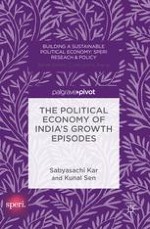2016 | OriginalPaper | Buchkapitel
2. A Political Economy Theory of Growth Episodes
verfasst von : Sabyasachi Kar, Kunal Sen
Erschienen in: The Political Economy of India's Growth Episodes
Verlag: Palgrave Macmillan UK
Aktivieren Sie unsere intelligente Suche, um passende Fachinhalte oder Patente zu finden.
Wählen Sie Textabschnitte aus um mit Künstlicher Intelligenz passenden Patente zu finden. powered by
Markieren Sie Textabschnitte, um KI-gestützt weitere passende Inhalte zu finden. powered by
